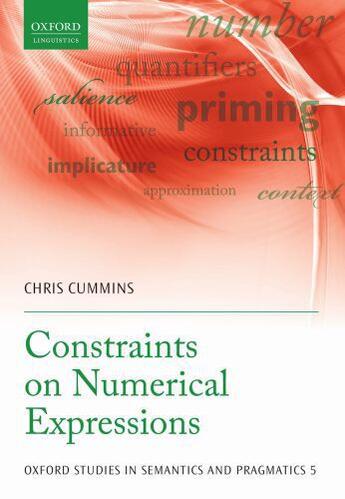Des idées de lecture pour ce début d'année !
Passionné(e) de lecture ? Inscrivez-vous
gratuitement ou connectez-vous pour rejoindre la
communauté et bénéficier de toutes les fonctionnalités du site !

This book considers how expressions involving number are used by speakers and understood by hearers. A speaker's choice of expression can be a complex problem even in relatively simple-looking domains. In the case of numerical expressions, there are often many choices that would be semantically acceptable: for instance, if 'more than 200' is true, then so is 'more than 199', 'more than 150', and 'more than 100', among others. A speaker does not choose between these options arbitrarily but also does not consistently follow any simple rule. The hearer is interested not just in what has been said but also in any further inferences that can be drawn.
Chris Cummins offers a set of criteria that individually influence the speaker's choice of expression. The process of choosing what to say is then treated as a problem of multiple constraint satisfaction. This approach enables multiple different considerations, drawn from principles of semantics, philosophy, psycholinguistics and the psychology of number, simultaneously to be integrated within a single coherent account. This constraint-based model offers novel predictions about usage and interpretation that are borne out experimentally and in corpus research. It also explains problematic data in numerical quantification that have previously been handled by more stipulative means, and offers a potential line of attack for addressing the problem of the speaker's choice in more general linguistic environments.
Il n'y a pas encore de discussion sur ce livre
Soyez le premier à en lancer une !

Des idées de lecture pour ce début d'année !

Si certaines sont impressionnantes et effrayantes, d'autres sont drôles et rassurantes !

A gagner : la BD jeunesse adaptée du classique de Mary Shelley !

Caraïbes, 1492. "Ce sont ceux qui ont posé le pied sur ces terres qui ont amené la barbarie, la torture, la cruauté, la destruction des lieux, la mort..."